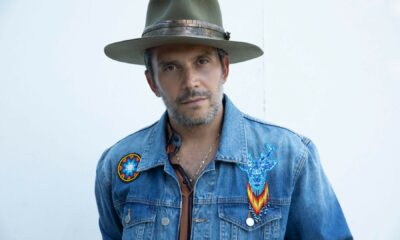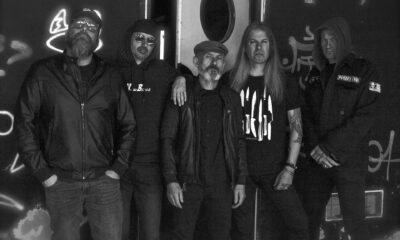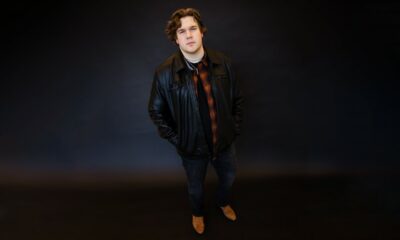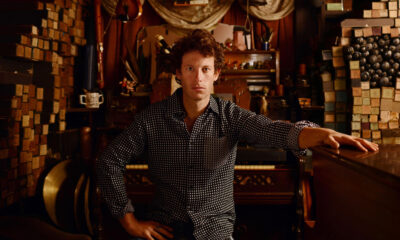Interviews
NOTHING MORE Guitarist Mark Vollelunga Talks Life Decisions, Crowd-Funding, Scorpion Tail Insurance and Performing [w/ Audio]
Nothing More recently performed in Toronto and guitarist Mark Vollelunga sat with us in the green room area of Budweiser Stage and answered questions while lead singer Jonny Hawkins wrestled with a trainer a few feet to our left behind the sofa.

In September of 2017, Nothing More (Jonny Hawkins, Mark Vollelunga, Daniel Oliver and Ben Anderson) released The Stories We Tell Ourselves, the follow-up to their 2014 self-titled debut. They utilized PledgeMusic for the release of Stories and used the Pledge interface to connect more deeply with their fans as they put the finishing pieces together on the album.
Nothing More recently performed in Toronto as one of the bands on the Five Finger Death Punch tour package that also featured Breaking Benjamin and Bad Wolves. Mark Vollelunga sat with me in the green room area of Budweiser Stage and answered questions while lead singer Jonny Hawkins wrestled with a trainer a few feet to my left behind the sofa. The audio is presented here as a SoundCloud link and you can hear Hawkins and his trainer in the background as Mark and I talk.
It’s been about a year since the release of your most recent album, right? Would you say, looking at that in hindsight, that it has met or exceeded your expectations, as far as an album goes?
Mark Vollelunga: Yeah, absolutely, it definitely has. The biggest thing obviously were the three Grammy nominations, I mean, we’d have been stoked with one (laughs), and getting nominated at all is a big childhood dream, and something any artist would hope to ever achieve. As well as, even now playing in front of 10,000+ people on this tour right now, with Five Finger Death Punch and Breaking Benjamin, and I think in a lot of ways, just traveling all over the world, seeing the reaction from people. I think the songs take it one step deeper into people’s hearts. As artists, I’m proud of ourselves to go that deep.
How about fan satisfaction? You interact with your fans, you ran a pledge campaign where you allowed them to interact with you during the cycle of the album; are they happy? Were they ecstatic with what you’ve done?
Vollelunga: Absolutely. I pride myself personally on treating everybody equally, and remembering at the end of the day we’re all just lovers of music. That’s why we got into this in the first place. A lot of bands might do the “at arm’s length” thing with their fans, and I think it’s important to be real and be on the same level as everybody. I can remember being a kid and thinking, “Oh man, it’d be so cool to meet this band or this artist.” And it’s pretty amazing now to where we’ve done that. I’ve met some of those people, and our heroes are now our peers. So the most important thing is to remember when I was young when I was getting started, what that feeling was like. And not to be a dick, not to be rude, and remember that we all just love and appreciate music, ‘cuz it changes the world, and it changes our lives.
“Just Say When” was the third single released from The Stories We Tell Ourselves.
I enjoyed being a part of your pledge campaign, which is still kicking in. I got a download last month for “Jenny” at Rock Am Ring. I wasn’t expecting that, so it’s cool that you are still servicing that campaign.
Vollelunga: Yeah, yeah, absolutely. And it’s kind of cool that that’s almost like bands’ stock. Where you can buy in, and you can say, “I did this. As a fan, I was a part of this, I helped create this album.” Not just from going to Best Buy like it used to be, or even before then (at) record shops. And that’s how you supported your band. Now you can see even further where your support goes.
Would you do Pledge again?
Vollelunga: Yeah absolutely, they’ve been a pleasure to work with. Even before Pledge, we did Kickstarter for the self-titled album, and there was an overwhelming amount of support too. It’s really cool, the crowdfunding, crowd-sourcing thing is so popular right now.
Right on. Can you talk a little about the structure that Daniel built while you tour? Did he just sit in a room and say, “Hey, I’m gonna build this monstrosity that’s gonna flip Jonny 80 degrees towards the crowd?”
Vollelunga: Kind of sort of. He had this idea to have DrumTron tilt, and I remember him telling me that, and thinking that it was impossible. I didn’t know what he was smoking or thinking or anything like that, but I wasn’t going to rain on his parade or anything. Even in the early stages of songwriting, you have to understand that the idea’s not done yet, you have to see the bigger picture. Even in that aspect, yeah, I totally couldn’t see the bigger picture.
Basically, there’s an airbag system that Dan built that throws Jonny fifteen feet in the air once the valve is released, that fills up the airbags and lifts Jonny up. Then he pulls up this big mechanical arm, which we dubbed “Scorpion Tail.” On top of it, Jonny’s up there, and he’s got a couple different levers and buttons that he uses to manipulate the band. We run the guitar and the bass through our amps through the computer, which through some software is able to pitch my guitar up and down in real time. So it’s almost like he’s DJ-ing the band in real time. Most DJs do that with pre-recorded audio, but this you’re seeing live, in real time.
It was really cool when Jonny approached us about doing something like this; he brought in this little video game controller, and he was pressing buttons, and we would hear sounds and tilting it sideways would throw my guitar an octave lower. And it was cool, but it didn’t look cool. That would be worthless on a stage; you’d just see a guy pressing buttons on a video game controller. So yeah, Dan got the idea to extremely exaggerate that into what you see now. We’ve definitely always been a band that tries to push ourselves to do something a little different. Remember at the end of the day, we are performers, and people are here to have an experience. I think a lot of bands forget that when they just play their songs. And songs are good, but what’s gonna make it different from you just listening in your headphones in your bunk or your bed or your car?
The Stories We Tell Ourselves was released on September 15, 2017, via Eleven Seven and Better Noise.

Does that mechanical structure bring with it any extra insurance waivers? Does it cost to take it apart? Is it a challenge, does it break down? Has anything like that happened?
Vollelunga: That’s funny. Yes, it does break from time to time. It’s never thrown Johnny into the audience or never injured anyone in the crowd, knock on wood. We do have insurance, we do pay an annual fee for if someone would be injured, that’s what it goes towards. We definitely do our best to be safe as we can! (laughs) It is very dangerous, and that’s sort of the reason it’s successful, too. You see Jonny go up and it’s like, “Oh man, I dunno what’s gonna happen. How is this thing there, how is this working?” And that’s part of the enjoyment.
One of the things I dig about watching your band, is that, and I don’t know this for sure, but I feel like you can all play each others’ instruments. Everybody can drum, I think I’ve seen guitars change. I feel like I’ve seen you hand off instruments onstage, and you all seem to do it seamlessly, that you can play each others’ instruments. Is that indeed true?
Vollelunga: To an extent. I will take pride in saying that I’m the best guitar player in the band, as I play guitar. Jon is the best singer, Dan’s the best bass player, Ben’s the best drummer. But yeah, obviously Jonny was our drummer, so it’s cool now, especially ‘cuz Ben did all the drums on this last record and Jonny didn’t play a single note, which is different from every other record that we’ve done. Jonny was able to trust Ben in that way. In the same way, sometimes I remember with “Fadein/Fadeout,” I had a lot of the orchestration already done in a lot of the parts.
But it’s important because we’re all friends and brothers, that I go in here trusting Dan and Jonny and Ben to make the part their own, and not to say, “No, this is it, you have to play it like this or I’m gonna play your part.” That’s not thinking long term. Yes, most of it was my idea and the things I had, but that’s sort of the beauty of the unknown. You don’t know what somebody else is gonna come up with, and it might be ten times better than your original idea. So it’s important to trust them in doing their job. In the same way, Jonny writes stuff too, and Dan too, and Ben, and we’re all in that same mindset.
Is it an easier thing for Nothing More to do a headlining show where you can play 90 minutes and fill your set out with some of the diverse music you play? Compared to tonight that’ll be a 30-40 minute set, where you’ve gotta cherry pick six or seven songs and try to sell everybody on your stuff in a shorter amount of time with a shorter spread of songs.
Vollelunga: That’s a great question. There are definitely advantages and disadvantages to both. In a headliner it is nice that we can do our thing; this is how we wrote the book or the movie, we don’t have to edit certain scenes out. But, it is also a marathon, and your energy bar depletes a lot quicker, ‘cuz it’s a lot longer of a show. For the shorter set, I think especially with us, because we have such a range of emotions in our songs, and tempos, songs that are much slower and more emotional that have really impacted a lot of people, and then songs that are upbeat and really in your face.
I do take pride in that as an artist, that we can cover that much ground. But yes, it is very hard to say, ok, we’re gonna play “This Is The Time,” and then we’re gonna play “Just Say When,” and then we’re gonna play “Go To War,” and then “Mr. MTV.” Those are all very different songs. And it depends on the crowd you’re playing in front of. Even tonight it is more of a metal crowd, but the current single we’re pushing is “Just Say When.”
Are you ready to “Go To War?!” This was the first video released from The Stories We Tell Ourselves.
Which is a softer song.
Vollelunga: Right, which is a strange audience to play in front of. But at the end of the day, with the way we set it up, I think it works really well. And the song is actually a win. It’s tough to do that, but I’m kind of proud that we stand out amongst all the other bands. And at the end of the day, a good song is a good song, regardless of genre, and I think everyone can appreciate that.
Are you surprised that a tune like “Just Say When” has caught on like it has? It’s charted really quickly, and it’s strong, it’s doing well on radio at the moment. Did you look at your body of work, and say, “That’s a single, that’s a single, and that’s a single,” or are you surprised by the songs that catch on?
Vollelunga: Yeah, I am. It’s hard because we really don’t ever go into songwriting thinking, “This is going to be a filler track.” So we take our time and do the best we can with every single song, and every one is our baby. For the past few records, that’s been a great problem that we’ve had. “Oh crap, which one are we gonna push?” The label looks at the data and says, “Okay, this.” With “Just Say When,” something we are hopeful for is that it will cross over and appeal to a wider range of music listeners. People that might not normally be into rock. And we can use it almost as a tool just to get there so they can learn about our band. So I’m stoked, and we’re pushing it, and it’s doing very well. Especially from the emotional aspect, too, I really think we’ve all been at that place in limbo, whether you don’t know whether to hold on or let go in a relationship. Unfortunately, we all get at that point sometimes.
You might not be able to answer this, but I’m going to ask it anyway. When you’re writing, and you bring riffs to the table, do you know when something is gonna become a song right off the bat? Or do you know when something’s tertiary, and it may go away, and it won’t become any element of the music?
Vollelunga: That is a good question. I feel like, yes, there’s a certain aura about a piece of work, whether it’s a riff or a lyric or a melody, that’s like, “I know that’s good, and I know that’s gonna work, and I have to show the guys.” Generally as a rule of thumb, what I’ve told myself, though, is that I know I get very excited, and especially whenever I’m currently working on something, I always think it’s the best thing I’ve ever done. And then I’ll wake up the next morning and realize, “Oh, this is crap.” So I use that feeling as a barometer, that I should sleep on this first and revisit it, then decide whether it’s worth something or not.
Can you talk a little bit about being a teenager, with the drive to be in a band? You guys all met young when you were in high school. Playing music when you’re in high school is a different thing. “We’re gonna make a living doing this, we’re gonna take this on the road” was always the aspiration. Did you always know that that was gonna work out?
Vollelunga: That’s a good question too, I like all these questions. (laughs) No, I didn’t totally know that. But I think early on I just kinda learned to trust my gut, and really go with what was important to me. Music was the most important, and I felt like I could make it my own, and hold onto it through middle school and high school when the changes of life are happening, and there are stresses and anxieties about cues and cliques. I could get away from all that, and I could go play guitar. I felt like I was really good at it too, that I could make that my own, let it identify me and become a part of who I am.
I would say yeah, it definitely helped me get through all that, as well as sure, fuel the fire to be the biggest band in the world or to do this for a living. I definitely had that drive, mainly just knowing that I loved music and how it impacted me, and how I wanted to give it back. When a song changes my life, I know that’s the best feeling in the world, and if I could give that back to other people, that’d be amazing.
Have a look at “Jenny,” live from Rock am Ring right here.
Did you have to have that conversation with your folks? Was it like, “I want to be a full-time musician?” Were they supportive? Were there some challenges?
Vollelunga: Right, right. My dad’s a military guy, so that was tough. My mom’s a big softie, so there was definitely conflict there, but I think I was very supported, heavily, by my parents, all through dropping out of college to pursue this band full-time. Even when we weren’t even paying our own bills, we’d be gone, and then we’d come back, and we’d all live at our folks’ houses for the first couple of years of doing this, until we were able to at least band together and get our own place, pay our bills. Only now I feel like we can sort of have a comfortable living. It’s nothing luxurious by any means, but it’s pretty awesome that we get to play music day in, day out, and be its evangelist, keep spreading the music and spreading the love. It is hard too, you know, with family at home, doing all that.
It’s a big question, right? “Mom, Dad, I wanna be a rock n’ roll star.” Most parents would just be like, “… No. Don’t even pursue it.” Some folks are pretty supportive, and they’ll let you pursue it, and you can turn it into something where you can make a living and raise a family and pay your bills.
Vollelunga: I don’t think that my parents thought it possible, but my mom always knew that I was kinda gifted with it, and really believed in me, and really did help out emotionally and financially. Especially when things were rough, and it’s like, “Okay, we’re gonna fire our fifth singer now, and Jon is gonna sing.” And it’s like, “Are you sure this is gonna work?” (laughs). So, yeah, I definitely have them to thank.
Last question, do you have any plans to capture your current album in a live format, either as a live recording or video recording that people can buy and enjoy in the comfort of their home?
Vollelunga: That’s a good question, I don’t know that answer. We’re perfectionists for sure, so it’s hard to say that we would be okay with something like that. Although recently, with that video that you saw, the “Jenny at Rock Am Ring,” I was thoroughly impressed, we all were, actually, and a lot of that has to do with, “Okay, now we’re making a little more money, we can pay our crew better.” We can get a better crew, and we’re extremely happy with our crew now and our current sound guy, and the amazing job he did. That was our first show on the European run, we actually thought we didn’t do that well, and seeing that footage and watching it back was pretty awesome. Ross, you’re kicking ass. So, we’ll see. Not yes, not no. Maybe.
-

 Alternative/Rock22 hours ago
Alternative/Rock22 hours agoThe V13 Fix #010 w/ High on Fire, NOFX, My Dying Bride and more
-

 Hardcore/Punk1 week ago
Hardcore/Punk1 week agoHastings Beat Punks Kid Kapichi Vent Their Frustrations at Leeds Beckett University [Photos]
-

 Culture1 week ago
Culture1 week agoCirque Du Soleil OVO Takes Leeds Fans on a Unique, Unforgettable Journey [Photos]
-

 Alternative/Rock7 days ago
Alternative/Rock7 days agoA Rejuvenated Dream State are ‘Still Dreaming’ as They Bounce Into Manchester YES [Photos]
-

 Music2 days ago
Music2 days agoReclusive Producer Stumbleine Premieres Beat-Driven New Single “Cinderhaze”
-

 Culture3 days ago
Culture3 days agoDan Carter & George Miller Chat Foodinati Live, Heavy Metal Charities and Pre-Gig Meals
-
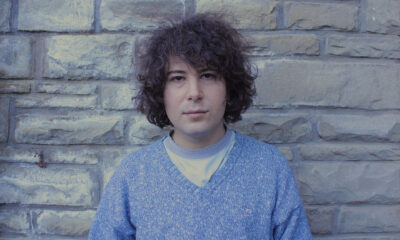
 Indie1 week ago
Indie1 week agoMichele Ducci Premieres Bouncy New Single “You Lay the Path by Walking on it”
-

 Alternative/Rock1 week ago
Alternative/Rock1 week agoWilliam Edward Thompson Premieres His Stripped-Down “Sleep Test” Music Video

